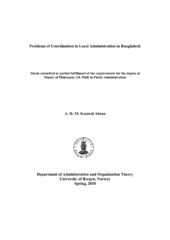Problems of Coordination in Local Administration in Bangladesh
Master thesis
Permanent lenke
https://hdl.handle.net/1956/4131Utgivelsesdato
2010-05-27Metadata
Vis full innførselSamlinger
- Department of Government [473]
Sammendrag
This study analyses inter-organisational coordination among various departments at the local level administration in Bangladesh. Unlike solo dance, efficient coordination is not achieved through individual action. Rather, it must be orchestrated through collective efforts towards a common goal. In this context, the objectives of this study are: to explore and identify the factors affecting coordination among various departments involved in policy implementation in an upazila; to determine the factors that cause coordination problems; and to identify and examine the determinants that can make a difference in the extent to which coordination is achieved in an upazila. This study reveals that the issue of inter-departmental coordination has neither been an ends of public administration, nor a means of policy implementation at the local level administration in Bangladesh. This is because although ensuring inter-departmental coordination is a sine qua non when policy is implemented by several departments, inter-departmental coordination suffers form the lack of clear division of labour, resources (financial and manpower), and regular communication, which takes place informally among departments involved in policy implementation in an upazila. Moreover, the persistence of a colonial legacy in the civil service has led to different organisational cultures among different cadres of civil service, particularly between the generalists and the specialists. This issue is also contributory to coordination problems. Thus, the author concludes that coordination has not been a philosopher's stone of public administration in Bangladesh; what has become important to civil servants is the completion of assigned functions perfunctorily. Thus, the issue of inter-departmental coordination can be exemplified by the highly individualistic approach of civil servants in carrying out their respective tasks. As a result, policy implementation is delayed, time and resources are wasted, and quality is compromised.
Utgiver
The University of BergenOpphavsrett
The authorCopyright the author. All rights reserved
